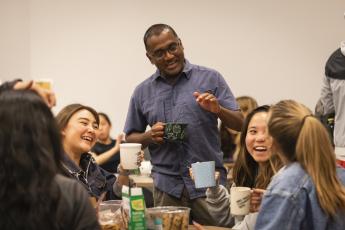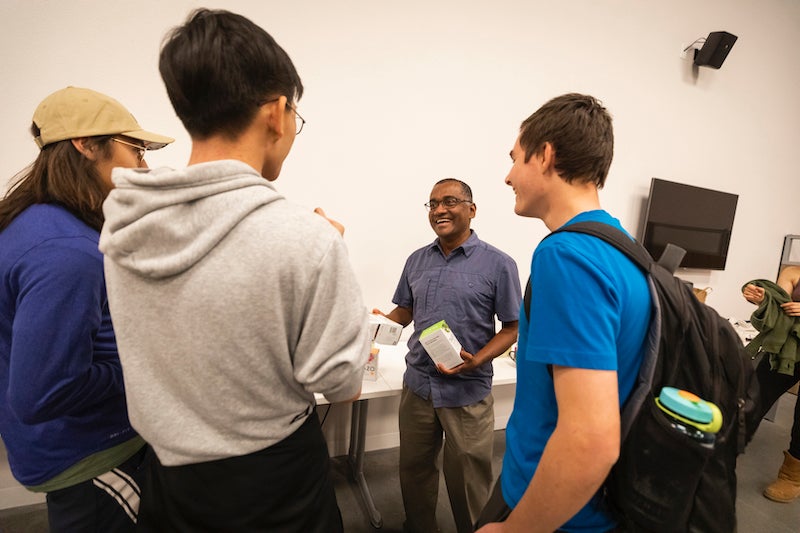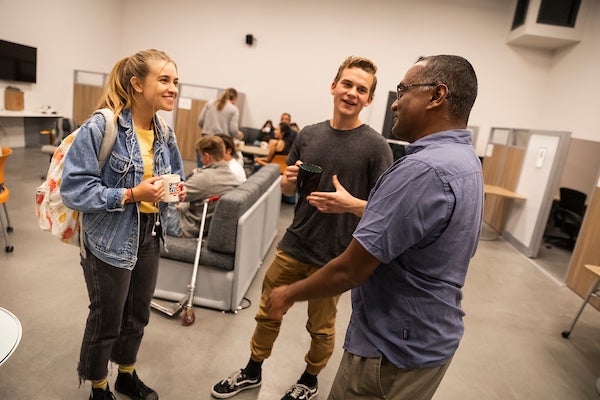'There’s Such a Culture of Inclusivity Here.' How One Professor Builds Community — By Living On Campus

It’s 7 p.m. on Wednesday, a few short weeks before finals for the winter quarter.
It’s quiet on campus, peaceful. But inside the yakʔitʸutʸu community center, it’s buzzing.
Students bustle around, getting up to pour another mug of tea, munching on cookies, chatting and making new friends.
At the center of it all is Nishi Rajakaruna, an associate professor in biological sciences.

Rajakaruna, the Faculty in Residence at yakʔitʸutʸu, circulates throughout the room. He pours tea, introduces people to each other, stops to greet a student’s dog and offers snacks to the people just walking in.
J Douds, a third-year sociology student, opens the door. She carefully puts her scooter to the side and surveys the room.
“Wow. This is so special,” she says, smiling. Douds, who met Rajakaruna that morning in the line at the U.U. Starbucks, said the professor invited her to stop by that night for tea.
Within a few minutes of arriving, Douds was seated at a table, chatting intently and laughing with a group of five students.
“When I was walking in, I felt like I was part of something so great,” Douds said. “There are all different majors, years and backgrounds represented and every person has a story about their interaction with Nishi.”
Anthony Luis, University Housing’s coordinator of student development for yakʔitʸutʸu, said he’s impressed by Rajakaruna’s nonstop energy and his ability to bring all sorts of people together.
“It’s Week 8 and all these people are here,” Luis said. “Nishi has this magnetic ability to draw people out of the halls and come hang out, talk, relax and make new friends. It’s a great stress reliever for the students.”
For his part, Rajakaruna says he gets a lot out of being a Faculty in Residence, finding new ways to connect to students and give back.

The associate professor, who arrived at Cal Poly nearly three years ago, left Sri Lanka at the height of the country’s civil war in the 1990s. He came to the United States to study at College of the Atlantic on Mt. Desert Island in Maine.
His fellow students and faculty welcomed him with open arms, both inside and outside the classroom. One professor, who became a mentor, helped him grocery shop and open a checking account.
“I thrived in that setting,” said Rajakaruna, who went on to teach at College of the Atlantic for about a decade. “Every time I’m in a bigger place, I feel like students are missing out.”
When the Faculty in Residence position first became available, someone suggested Rajakaruna apply for it.
“I interact closely with a lot of students through teaching and research,” Rajakaruna said. “But through this position, I can reach a lot more people.”
As a Faculty in Residence, Rajakaruna has been to residents’ birthday parties and hosted movie nights. He’s also brought professors to yakʔitʸutʸu to hold office hours and to give talks about their travels and research, in an effort to bring professors closer to their students.
“People come talk to me about their plans for next summer, or about how to get through homesickness,” Rajakaruna said. “I take people shopping. I’ve gotten to know parents and grandparents. It’s turned into a family of sorts.”
In addition to regular tea nights, Rajakaruna also runs a hiking club called Plants, Peaks and Pals — so named because he takes students hiking on local trails, they look at plants together and the goal is to make friends.
“Whether it is a hike I lead or a tea party I host, I want people to find a common space to talk about how their day went, what their plans are for tomorrow and beyond, and learn from each other,” Rajakaruna said.
He added that he’s tried to build community everywhere that he’s taught — from College of the Atlantic to San Jose State University to Cal Poly — and says the people he’s connected to throughout his years as a teacher and scholar have become his family.
“This kind of interaction keeps me happy,” he said. “I don’t think of Cal Poly as a job—it’s a way of life for me. My day doesn’t end when I’m done teaching.”
As Douds got ready to leave tea night, having said goodbye to Rajakaruna, two students came up and asked for her Instagram username, so they could connect again.
“There’s such a culture of inclusivity here, of encouraging people to come as they are,” Douds said. “This is a really special thing to be a part of.”




